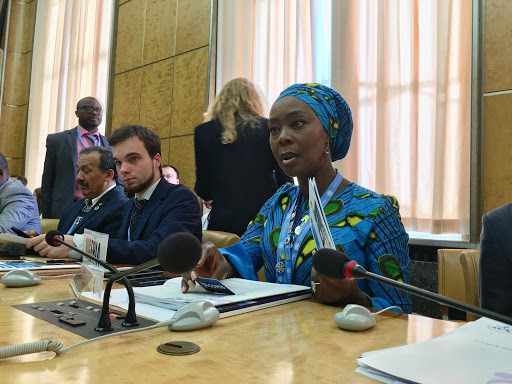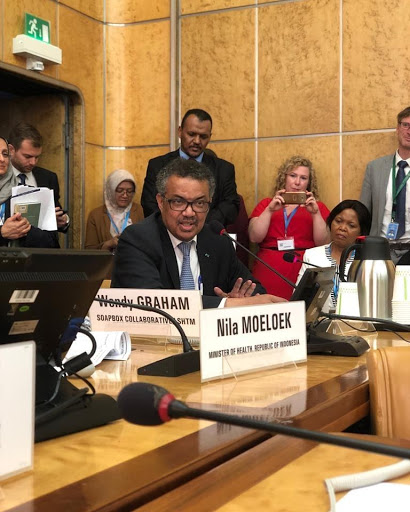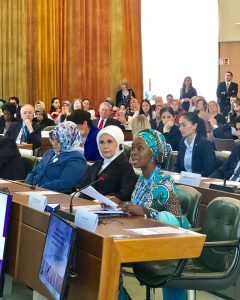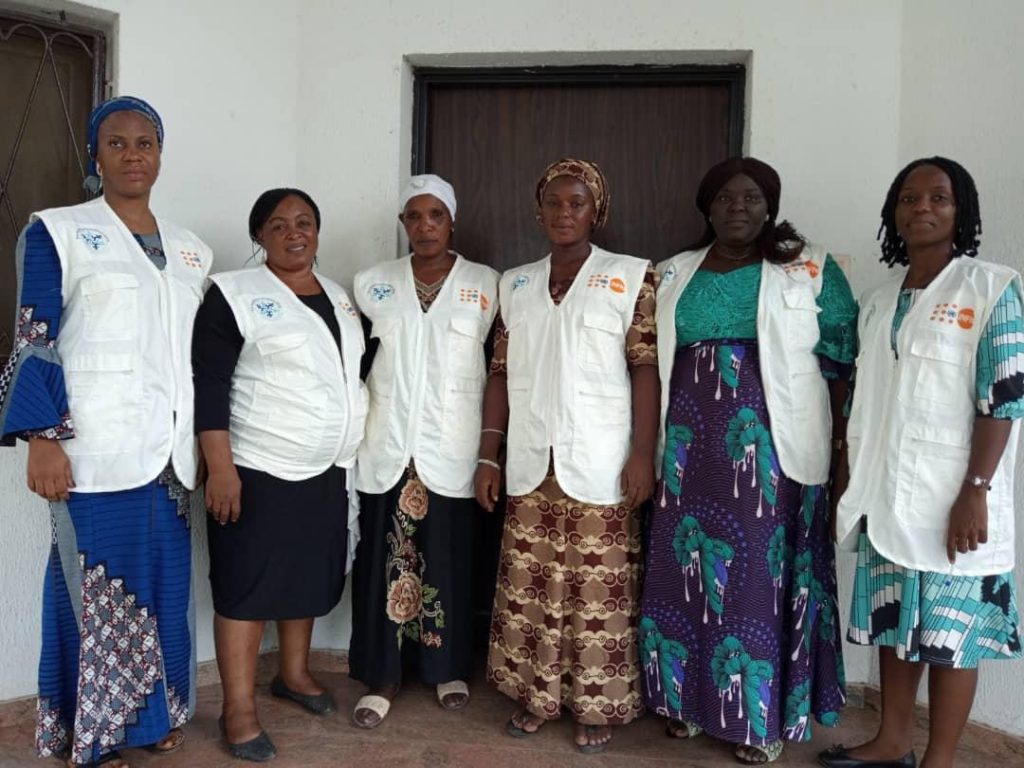FROM June 5th, 2019
Founder-President of the Wellbeing Foundation Africa (WBFA) Toyin Saraki this week made a series of high-level interventions at Women Deliver 2019, the world’s largest conference on gender equality and the health and rights of girls and women in the 21st century, bringing together thousands of advocates to explore the solutions to achieve a more gender-equal world.
Mrs Saraki, who is also the Global Goodwill Ambassador for the International Confederation of Midwives and Special Adviser to the Independent Advisory Group to the WHO Regional Office for Africa, joined world leaders including President of Ethiopia Sahle-Work Zewde, and Her Royal Highness Mary, Crown Princess of Denmark, as she led the WBFA delegation to advocate at multi-lateral events, meetings and plenaries.
In her intervention at the World Health Organization event on eliminating cervical cancer, Toyin Saraki highlighted the ground-breaking ‘Rapid Assessment of the Prevention and Control of Cancer in Nigeria’ report carried out by the Wellbeing Foundation Africa last year, with support from an Amref Health Africa research grant and Takeda Pharmaceutical Company, and commented:
“The rate of 80% of patients who are at a stage of advanced disease at time of presentation leaves little hope for many, especially given the lack of functional radiotherapy machines and other tools for diagnosis and treatment.”
“As we are gathered for Women Deliver 2019, we will all be aware that cervical cancer is, by definition, a gendered issue. One woman dies of cervical cancer every two minutes, making it one of the greatest threats to women’s health. I therefore welcome the Joint Programme established by 7 UN agencies under the United Nations Task Force on NCDs, to prevent and control cervical cancer, providing global leadership and technical assistance to support governments and the partners to build and sustain programmes, and call for a greater focus on prevention. That means going beyond giving the human papilloma virus (HPV) vaccination to adolescent girls, to also include boys and married women”.
Mrs Saraki made interventions on further high-level events, including at a multi-lateral session on the future of digital training for frontline healthcare workers, which was also addressed by Her Royal Highness Mary, Crown Princess of Denmark.

“At Women Deliver 2019 I have advocated for the Wellbeing Foundation Africa’s Gender Development Goals, as we stand on a gender precipice. Since 2014 the WBFA has acted on its eponymous goals, casting a gender lens on all of its programmes, and putting midwives at the heart of women’s wellbeing.”
“It has been a pleasure to join leaders, experts and advocates, as we work together to create a more equal world for women and girls to the benefit of every community. I welcome the new commitments that have emerged at Women Deliver 2019, including the gender funding promise made by Justin Trudeau, Prime Minister of Canada, whilst calling for a re-energisation of the global community to ensure that equality and equity becomes a reality at every level.”
FROM June 3rd, 2019
Toyin Saraki is this week leading the Wellbeing Foundation Africa (WBFA) delegation to the Women Deliver 2019 conference in Vancouver, Canada. The gathering is the world’s largest conference on gender equality and the health and rights of girls and women in the 21st century, bringing together thousands of advocates to explore the solutions to achieve a more gender-equal world.
Mrs Saraki will join global leaders including Prime Minister Justin Trudeau of Canada and Sahle-Work Zewde, President of the Federal Democratic Republic of Ethiopia, at high-level meetings and sessions on a wide range of issues related to gender.

Speaking in advance of the opening ceremony on Monday 3rd June, Mrs Saraki commented:
“I am delighted to join leaders, experts and advocates at Women Deliver 2019, as we work together to create a more equal world for women and girls to the benefit of every community.”
“As the Global Goodwill Ambassador for the International Confederation of Midwives, I will advocate for the security of frontline healthcare workers to be prioritised around the world, and in particular in areas which constitute fragile humanitarian settings. Midwives are the key interlocutors and agents of change to keep women and girls alive and enable them to thrive: but they can only do so if they themselves are safe, well-trained and able to provide the full scope of their services.”
“The key theme of Women Deliver 2019 is power and altering power structures. I will be advocating for global investment in women’s groups to lead grassroots efforts and engage with traditional and religious leaders, so that we can shift the conversations that occur within communities. The social safety framework in Nigeria, for example, is often not the government; it is the extended family – so when that fails, women are left incredibly vulnerable. But if you strengthen the community it is better placed to support those in distress; those who have for instance been the victims of conflict and sexual violence.”
“I also believe that the passing of a comprehensive Gender Equality and Opportunities bill into law in Nigeria is a crucial element to bring about manifest progress for women and girls. Successive National Gender Policies have attempted to assess the demographic situation, provide policy context for the evolution of gender and development frameworks, and provide strategies: but their effect is not reaching women and girls. Alongside key health interventions, representation for women at the highest levels will form the key bedrock of my advocacy at Women Deliver this year.”

Isaac Ejakhebe, Project Manager for the WBFA Emergency Obstetric and Newborn Care (EmONC) programme in Nigeria, and a Women Deliver Young Leader, addressed the midwifery symposium organised by the International Confederation of Midwives and commented from Vancouver: “Since the Women Deliver global conference in Denmark in 2016, the Wellbeing Foundation Africa has been thrilled to be part of this pivotal movement, when a global community of advocates comes together to demonstrate the power of gender equality. We know that power can be used for good, can create progress, and will deliver the change we want to see for girls, women and youth.”
Mrs Saraki, who is also the Special Adviser to the Independent Advisory Group to the WHO Regional Office for Africa, will make a series of high-level interventions at Women Deliver 2019, including at an WHO session focused on combating cervical cancer. Last year the Wellbeing Foundation Africa released its ground-breaking ‘Rapid Assessment of the Prevention and Control of Cancer in Nigeria’ report, the first independent national research on cancer provisions. The study was led by the WBFA with support from an Amref Health Africa research grant and Takeda Pharmaceutical Company.
FROM May 23rd, 2019
Her Excellency Toyin Ojora Saraki, Founder-President of the Wellbeing Foundation Africa, addressed the World Health Assembly yesterday on ‘Why water, sanitation and hygiene must be a priority for quality healthcare.’
The high-level intervention came at a symposium organised by the Governments of Zambia, Tanzania, Sweden, Japan, Germany and Eswatini; the World Health Organization and WaterAid.
Mrs Saraki expanded on the campaign she launched last year to dramatically improve water, sanitation and hygiene (WASH) conditions in healthcare facilities in Nigeria and around the world, calling for a whole-system approach to tackling systemic failures.

Following her intervention, Mrs Saraki commented:
“I was honoured to speak to the representatives of Governments from around the world and global institutions at the World Health Assembly to advocate for a transformation of WASH standards.”
“According to UNICEF, 7,000 newborn babies died every day in 2017, mostly from preventable and treatable conditions including infections like sepsis, directly linked to poor WASH conditions. One in four health care facilities around the world lacks basic water services, impacting over 2 billion people.”
“Last year I called on all Governments to adopt the WHO’s resolutions on WASH and sepsis, and I agree with Dr Tedros’ warning that we must “go back to basics” – medicine has achieved so much, yet without universal access to safe water, sanitation and hygiene we will never achieve universal health coverage.”
“Hand hygiene must be a quality indicator in every facility and a national marker of health care quality, with access to soap and water monitored and assessed.”
“WASH conditions in healthcare facilities are our first line of defence as infection prevention and control. Dangerous conditions put not only patients in danger, but also workers on the frontlines of healthcare.”
“In Nigeria, the WHO found that 29% of healthcare facilities do not have access to safe water and toilets, whilst a WaterAid survey revealed that half of primary health facilities do not have handwashing facilities in delivery rooms. Pregnant women and newborns are thereby placed in huge danger and at risk of sepsis, which is a leading cause of death in hospitals. As the Founder-President of the WBFA, I work with our midwives through our frontline healthcare programmes to ensure that mother and baby are safe from birth through to age. Without adequate WASH facilities, however, midwives all over the world are unable to safely carry out their crucial work – and to lead the way with quality care.”

World Health Assembly delegates were also addressed by Dr Tedros Adhanom Ghebreyesus, Director-General of the World Health Organization; Hon. Senator Lizzie Nkhosi, Minister of Health, Eswatini; Professor Dr. Nila Faustine Ndugulile, Deputy Minister of Health, United Republic of Tanzania; Dr Abel Kabalo, Director, Ministry of Health, Zambia; Dr Naoko Yamamoto, WHO Assistant Director General of Antimicrobial Resistance at the World Health Organization; Professor Wendy Graham, Chief Scientific Adviser, Soapbox Collaborative and Professor at the London School of Hygiene and Tropical Medicine; Kaveri Mayra, a midwife representing the International Confederation of Midwives; Lucy Singh from the University of Aberdeen; Dr Maria Neira, WHO Director, Department of Public Health, Environmental and Social Determinants of Health; Tim Wainwright, Chief Executive, WaterAid UK, Dr Kirana Pritasari, Director of the Ministry of Health of Indonesia; and Anders Tegnell from Public Health Sweden.
FROM May 22nd, 2019
Toyin Saraki, Founder-President of The Wellbeing Foundation Africa (WBFA) and Special Adviser to the Independent Advisory Group of the WHO Regional Office for Africa, yesterday addressed a high-level meeting at the World Health Assembly on how to better align solutions to Women’s, Children’s and Adolescents’ Health and Well-being in Humanitarian and Fragile Settings.
The symposium and call to action organized by the Partnership for Maternal, Newborn and Child Health (PMNCH) and the World Bank, was also addressed by Dr Tedros Adanhom Ghebreyesus, WHO Director General, Helga Fogstad, PMNCH Executive Director and Her Excellency Mrs Emine Erdogan, First Lady of The Republic of Turkey.

In her remarks, Mrs Saraki commented:
“Thank you to PMNCH for your timely and powerful call to action. As a Nigerian who has long worked with frontline healthcare workers to empower women, their infants and their communities to stay healthy, safe and to thrive, I know that if we are to achieve universal health coverage, and truly leave no-one behind, we must better align our investments and efforts taking a life-course approach to safeguard women, children and adolescents in humanitarian and fragile settings and uphold their human right to the highest attainable standard of health”.
“Given that more than two billion people live under the threat of conflict and emergencies of diverse and complex natures, and that 69 million people have been displaced by humanitarian crises, we need bold steps to enhance coordination and bring together synchronized knowledge, policies and actions for a whole-system approach to achieving health for all, especially in protracted emergencies and in the humanitarian-development nexus. That is why I so strongly support this initiative and call to action from PMNCH, which is best placed to bring us all together – from every sector, region, country and background – to remove the inefficiencies, identify and address gaps of capacity and delivery in every sense”.
“As the Global Goodwill Ambassador for the International Confederation of Midwives I welcome the launch yesterday of the report ‘Strengthening quality midwifery education for Universal Health Coverage 2030: A transformative approach to improving quality of care.’ produced by ICM, alongside WHO, UNFPA and UNICEF. Women and newborns are the most vulnerable in humanitarian and fragile settings where quality midwifery education saves lives by preparing all midwives to prepare for and respond to emergency health situations”.
“It lends significant weight to PMNCH’s initiative, as we seek to provide comprehensive training and support necessary for midwives to provide the full scope of services in situations which are often dangerous and highly prone to change”.
“In a year when we have lost midwives, nurses and doctors on the frontline of healthcare, we all know how critical this initiative is.”
“PMNCH is best placed to mobilise partnerships of all kinds, and can act as the standard-bearer and interlocutor between the WHO, global institutions, CSOs, governments, the private sector and frontline healthcare workers. This support is invaluable to Governments and healthcare providers as the duty-bearers. At the Wellbeing Foundation Africa we have learned the value which emanates from engagement with PMNCH in Nigeria, as members who supported the ‘Saving One Million Lives’ campaign, the promotion of and ORS formula and zinc for management of diarrhoea, and the Midwives Service Scheme, a public sector collaborative initiative, designed to mobilize midwives, including newly qualified, unemployed and retired midwives, for deployment to selected primary health care facilities in rural communities.”
“We know that the road to universal health coverage does not rest upon one single static action, but on the spectrum of interventions and initiatives; from water, sanitation and hygiene standards in healthcare facilities to breastfeeding education and training for healthcare workers. In a country as large as Nigeria, resilience throughout the whole nation’s system is necessary if we are going to be able to tackle critical health emergencies in fragile settings, for example in the north-east. That is why a strengthened primary health care system is imperative as the foundation and bedrock of achieving health for all and should be a focal point for investment.”
“I call on all partners and stakeholders to rally behind PMNCH, to support this initiative and most importantly commit to action which will make health for all a reality. Together we can make sure that no-one is left behind”.
The symposium was also addressed by Anshu Banerjee, Director, Maternal, Newborn, Child and Adolescent Health, WHO, Manuel Carballo, Executive Director, International Centre for Migration, Health and Development, Rashid Khalikov, Assistant Secretary General for Humanitarian Partnership in Middle East and Asia, Joy Phumaphi, Executive Secretary, ALMA 2030; EWEC Independent Accountability Panel Co-Chair; and Member of the SUN Movement Lead Group, Tim Evans, Senior Director of Health, Nutrition and Population, The World Bank.
FROM May 20th, 2019
The Wellbeing Foundation Africa (WBFA), led by its Founder-President Toyin Ojora Saraki, is this week attending multilateral meetings at the 72nd World Health Assembly in Geneva, Switzerland.
The World Health Assembly is the decision-making body of the World Health Organization (WHO); determining the policies of the WHO, supervising financial policies, and reviewing and approving its programmatic budgets.
Toyin Saraki, who also serves as Special Adviser to the Independent Advisory Group of the WHO Regional Office for Africa, will speak at high-level events throughout the week, including alongside WHO Director-General Dr Tedros Adhanom Ghebreyesus and H.E. Mrs Emine Erdogan, First Lady of The Republic of Turkey, focusing on aligning women’s, children’s and adolescents’ health and wellbeing in humanitarian and fragile settings and frontline healthcare workers.
Speaking upon arrival at the World Health Assembly, Toyin Saraki commented:
“It is auspicious that my first engagement at the World Health Assembly this year is to celebrate ‘heroines of health’ alongside Women in Global Health, Johnson & Johnson and Medtronic Foundation. Women make up 70% of the global health workforce but are underrepresented in positions of leadership. If we are to achieve universal health coverage and leave no-one behind by 2030, we must drive change for gender equity and strengthen healthcare workers.”
“I support Dr Tedros’ call to action to address the predicted shortfall of 18 million health workers and, as Global Goodwill Ambassador for the International Confederation of Midwives, welcome the launch of the report conducted by WHO, ICM, UNFPA and UNICEF: ‘Strengthening quality midwifery education for Universal Health Coverage 2030: A transformative approach to improving quality of care.’”
“Women and newborns are the most vulnerable in humanitarian and fragile settings. Quality midwifery education saves lives by preparing healthcare workers emergency health situations. Investing in the health and social workforce is critical to the attainment of the health Sustainable Development Goals and I look forward to working with the WHO, global partners and frontline healthcare workers to make that a reality”.
FROM May 14th, 2019
The Wellbeing Foundation Africa has announced a major expansion of its MamaCare Antenatal and Postnatal Education program in the Federal Capital Territory Abuja. The ‘MamaCare + Nutrition program’ will now reach four more local government associations and a further twenty-eight healthcare facilities.
The Foundation has strengthened its midwifery workforce, who will help the program to reach an additional 11,000 mothers and newborns annually with respectful inter-personal maternity care, communications, education and counsel.
This expansion, which will improve the nutrition component of the MamaCare program, is being supported by the United Nations Population Fund (UNFPA), the lead UN agency for delivering a world where every pregnancy is wanted, every childbirth is safe and every young person’s potential is fulfilled.
Toyin Saraki, Founder-President of the Wellbeing Foundation, praised the partnership expansion, commenting:
“As events to mark International Day of the Midwife draw to a close, I am delighted that with the support of the United Nations Population Fund, we will be enabling so many more mothers to access quality antenatal and postnatal health with our life-saving Mamacare programme.”
“It is also crucial that we have been able to adapt the program to lend a greater focus to nutrition. The first 1,000 days of a child’s life offer a critical window of opportunity for preventing undernutrition and its consequences as part of the reproductive health care continuum, and will be vital if Nigeria is to meet its commitments under the 2030 Agenda for Sustainable Development.”
“According to UNICEF, malnutrition is a direct or underlying cause of 45 percent of all deaths of children under the age of five. Nigeria has the second highest burden of stunted children in the world, with a national prevalence rate of 43 percent of children under five – translating into 16.5 million children.”

Mrs Amy Oyekunle, CEO of the Wellbeing Foundation Africa, commented:
“Our research reveals a clear link between anaemia and sub-optimal maternal nutrition, and a mother’s success in establishing the essential lactation and breastfeeding to give her newborn the best start in life. The Foundation delivers on the eight antenatal care visits recommended by the World Health Organization, and follows up with new mothers to ensure that breastfeeding is being undertaken – for the good of mother and baby.”
“Thank you to our Mamacare midwives, who are at the heart and frontline of our work.”
The intended outcome of the partnership is to ensure that Nigerians enjoy improved well-being through sustainable, equitable and quality basic social and protection services which fulfil their human rights and contribute to greater social cohesion and economic development.